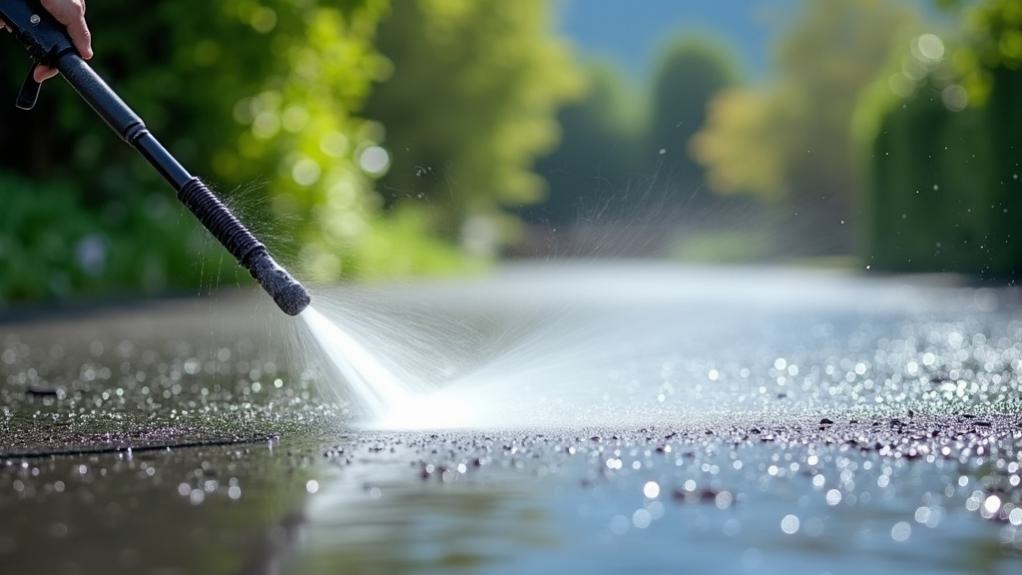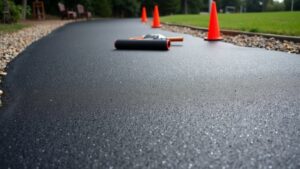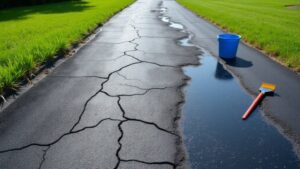You can pressure wash your asphalt driveway, but you need to do it carefully to prevent damage. Use a pressure setting between 1000 to 3000 psi, and start at the lowest pressure to see how your driveway reacts. Always inspect for existing cracks or pitting before washing, and avoid focusing too much pressure on damaged areas. Consider using wide-angle nozzles to distribute pressure evenly. After washing, a sealcoat applied every 1-2 years will help protect your driveway’s integrity. If you’re interested, there’s more to learn about ideal techniques and maintenance practices to keep your driveway looking great!
Key Takeaways
- Yes, you can pressure wash an asphalt driveway, but low pressure settings (1000 to 3000 psi) are essential to avoid damage.
- High-pressure washing can displace gravel and cause material loss, so start with the lowest pressure setting.
- It’s crucial to inspect for existing damage before cleaning to avoid exacerbating any issues.
- Regular sealcoating after cleaning enhances durability and protects against weather damage.
- Alternatives like dry sweeping and mild detergent solutions are safer for light cleaning without risking asphalt integrity.
Overview of Pressure Washing Asphalt
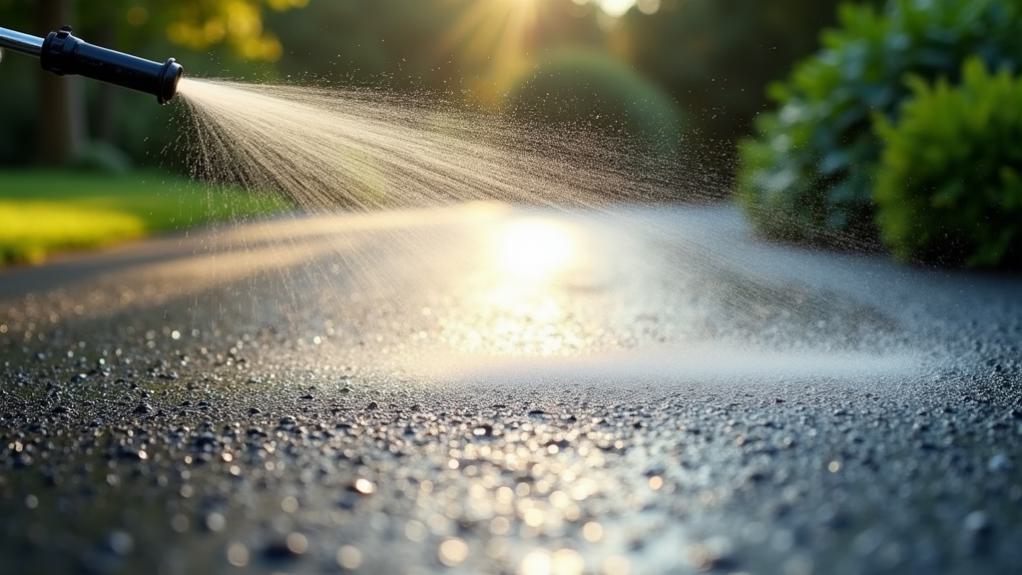
When it comes to maintaining your asphalt driveway, pressure washing can be a powerful tool. It effectively removes dirt and debris that can mar the appearance and integrity of your surface. However, you need to exercise caution to avoid damaging the asphalt. High-pressure washing is generally not recommended, as it can displace gravel and lead to material loss. Instead, stick to low pressure settings, ideally between 1000 to 3000 psi, using the right nozzles to minimize risk.
Regular sealcoating can also help protect your driveway, enhancing its durability and resilience against weather damage, as noted in the benefits of sealcoating insights.
Before you start pressure washing, pre-cleaning is essential. Dry sweeping your driveway removes loose debris, helping you prevent further damage during the cleaning process.
Regular maintenance, including pressure washing and resealing every 1-2 years, is vital for prolonging the life and appearance of your asphalt driveway. By keeping your driveway clean and well-maintained, you not only enhance its aesthetic appeal but also protect your investment.
Preparation Steps for Cleaning
Before diving into the pressure washing process, it’s vital to prepare your asphalt driveway properly. Start by clearing the area of all furniture, planters, and debris to guarantee an unobstructed cleaning process. This step is significant for effective pressure washing and aligns with the practices of trusted asphalt paving services in Etters, which emphasize quality preparation.
Next, inspect the asphalt surface for existing damage, such as cracks, pitting, or raveling. Mark these areas so you can avoid exacerbating issues during the cleaning process. It’s important to address these problems after washing, not before.
Conduct a thorough dry sweeping of the driveway to remove loose materials like dirt and leaves. This prevents clogging your pressure washer and guarantees a more efficient clean.
Additionally, assess the driveway’s slope and drainage points. Understanding how water will flow during washing helps you manage runoff effectively, preventing pooling or unwanted erosion.
For best maintenance, consider asphalt seal coating to extend the life of your driveway.
Effective Cleaning Techniques
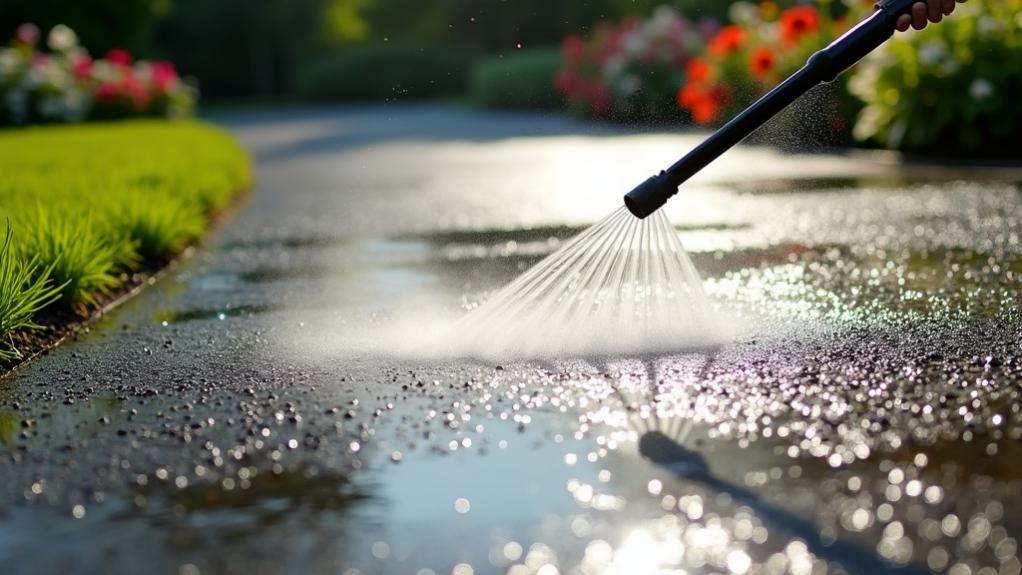
Effective cleaning techniques are vital for restoring your asphalt driveway to its former glory. Before you start, inspect for any existing damage like cracks or pitting to prevent exacerbating these issues. Setting your pressure washer between 1000 to 3000 psi, starting at the lowest pressure, is essential to guarantee you can effectively clean your driveway without damaging the surface. Additionally, consider that regular maintenance options, such as seal coating, can greatly extend the lifespan of your asphalt surface, providing added protection after cleaning high-quality service.
When it comes to cleaning, work methodically from one area to another, beginning at high spots and moving downward. This approach helps avoid relocating dirt and debris back onto freshly cleaned sections.
For stubborn oil stains without pre-treatment, apply an asphalt-appropriate degreaser first. Let it sit for 1-2 hours, scrub the area, and then rinse thoroughly with your pressure washer.
Remember to use wide-angle nozzles to distribute pressure evenly, preventing prolonged high pressure in one spot, which could damage the surface.
After a thorough work of cleaning, consider using a suitable cleaning solution to further enhance the appearance of your driveway. Finally, once everything’s clean, a good practice is to clean and reseal your asphalt to protect it from future wear and tear.
Damage Prevention Strategies
Cleaning your asphalt driveway doesn’t just restore its appearance; it also opens the door to potential damage if not handled correctly. To prevent this, use a pressure washer with adjustable settings. This way, you can minimize the risk of excessive pressure that might displace gravel or cause raveling.
Opt for wide-angle nozzles to distribute pressure evenly across the asphalt. Concentrated pressure in one area can lead to significant damage, so maintaining a safe distance between the nozzle and the surface is essential to avoid gouging or eroding the material.
Before you begin cleaning, inspect your driveway for existing cracks or damage. Mark these areas to guarantee you don’t exacerbate any issues during the pressure wash.
Additionally, utilize low-pressure rinses and appropriate cleaning agents that are safe for asphalt. Avoid caustic chemicals, as they can compromise the integrity of the pavement.
Resealing and Maintenance Tips
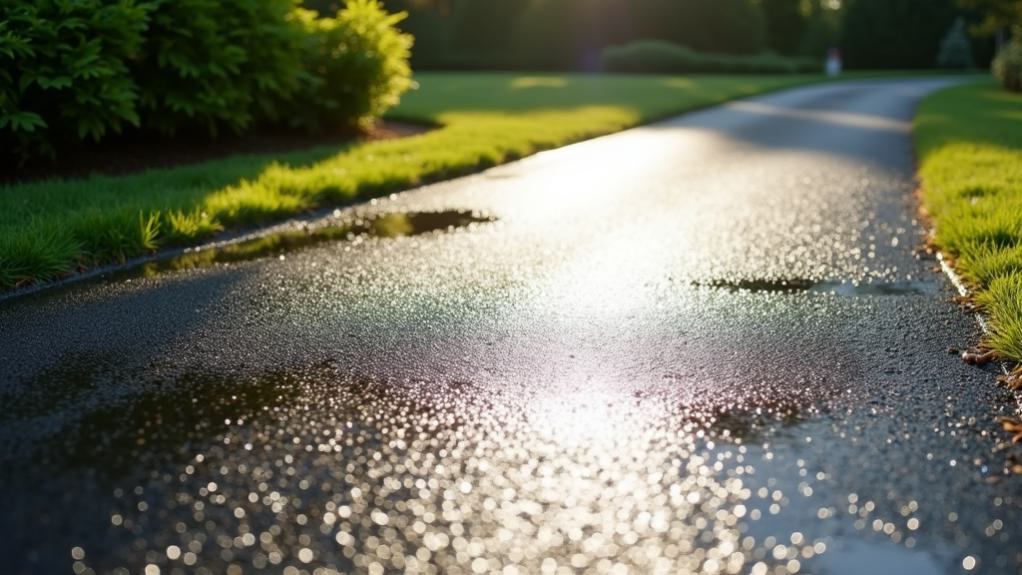
Resealing your asphalt driveway is vital for maintaining its durability and appearance over time. You should plan to reseal every 1-2 years to protect against fading, wear, and the damaging effects of weather and traffic.
Before you apply sealcoat, make sure that your asphalt is completely dry for 12-24 hours after you pressure wash the asphalt. This allows for effective adhesion.
Proper cleaning of the asphalt surface is important before resealing. If dirt and debris are left behind, they can prevent the sealcoat from bonding properly, reducing its effectiveness.
Here are some maintenance tips to keep in mind:
- Inspect regularly: Check for cracks and other signs of wear to address issues early.
- Choose professional application: Hiring experts guarantees uniform coverage and ideal protection for your asphalt surface.
- Use the right products: Select high-quality sealcoat to enhance longevity and protection.
Alternatives to Pressure Washing
When it comes to maintaining your asphalt driveway, there are several alternatives to pressure washing that can help preserve its appearance and integrity. Instead of using a pressure washer, consider dry sweeping to remove loose debris and dirt. This method is gentle and helps maintain integrity without risking damage to the surface.
For tackling oil stains, you can apply absorbent materials like kitty litter or specific asphalt degreasers, which effectively lift stains without high-pressure washing.
Regularly cleaning asphalt with a mild detergent solution and a soft-bristle brush will also help you avoid surface damage while keeping it looking fresh.
If you need to rinse the driveway, a low-pressure rinse with a garden hose is a safer option for removing light dirt and debris, as it won’t disturb gravel or harm the asphalt.
Additionally, scheduling professional maintenance, like sealcoating every 1-2 years, can provide long-term protection and enhance the appearance of your driveway without the need for pressure washing.
Conclusion
In summary, while pressure washing your asphalt driveway can restore its original charm, it’s essential to approach it with care. Think of it as giving your driveway a spa day—refreshing yet gentle. By following the preparation steps and damage prevention strategies outlined, you’ll guarantee your driveway not only looks great but lasts longer. If pressure washing feels intimidating, consider other methods to keep your asphalt in tip-top shape. After all, a little maintenance goes a long way!
